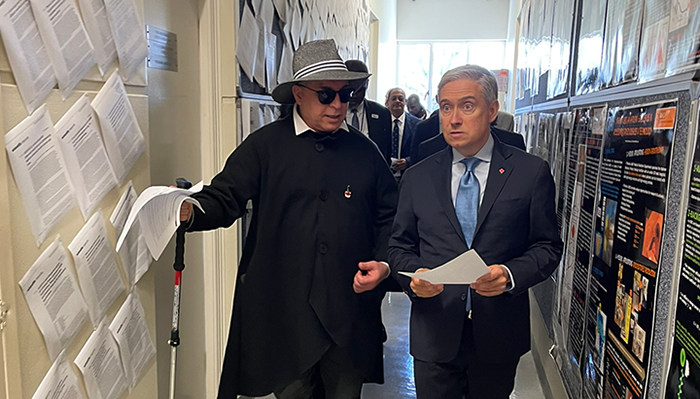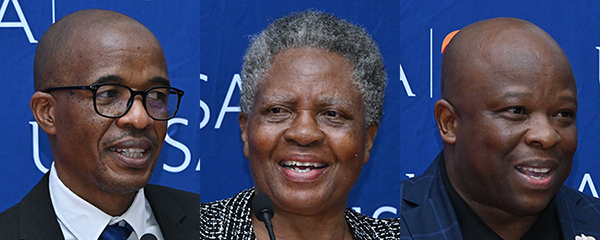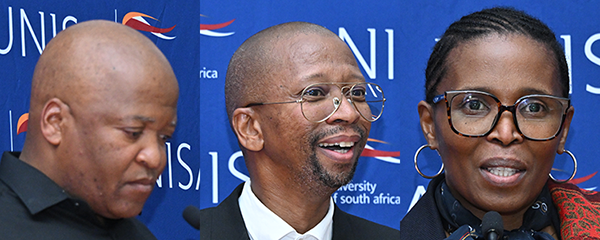

Unisa’s marathon achievers proudly displaying their certificates
On 3 December 2025, the Department of Institutional Advancement (DIA) hosted a gala dinner to honour athletes who proudly represent Unisa in major athletics events across the country and beyond
Delivering his welcome note on behalf of the Principal and Vice-Chancellor, Prof Mpho Ngoepe, Acting Vice-Principal: Research, Postgraduate Studies, Innovation and Commercialisation, expressed sincere appreciation to all esteemed guests, runners and walkers in attendance.
Drawing from his own experience as an accomplished runner, he shared words of wisdom that resonated deeply with the audience. Reflecting on the spirit of the Comrades Marathon, Ngoepe used a vivid metaphor, "Even the fastest zebra knows the lion doesn’t chase for fitness", to illustrate that not every challenge is a competition but rather a test of awareness, purpose and survival.

From left: Prof Mpho Ngoepe, Rosina Sediba Modibane and Bongani Ndaba
Offering encouragement to the athletes, he reiterated one of his guiding philosophies: "As long as you can walk, you can finish the Comrades Marathon". He went on to say that the very presence of the attendees at the gala was evidence of their self-motivation and resilience. Ngoepe pointed out to the audience that progress is not measured by speed but by consistency – much like the tortoise, whose steady perseverance ultimately secures victory. He concluded by stating that the only barrier between individuals and their goals is the limiting story they tell themselves, affirming his belief that everyone has the potential to be a runner.
Taking the podium as the guest speaker was Rosina Sediba Modibane, an honoured trailblazer introduced by Ngoepe. She reflected on her early love for sport, noting that although athletes of her era received no payments, her passion for running kept her committed.
She spoke about the challenges women faced when competing against their counterparts at a time when their goal was to represent South Africa at the Olympics. Expanding on this, she went on to recount how her promising athletic journey was unexpectedly cut short by a knee injury, which forced her to pursue a different career path. Despite this setback, she remained a prominent figure in the athletics community and continued inspiring others through her participation.
Modibane recalled the criticism she received from fellow female athletes concerning her injury and marital status, yet emphasised that her determination came from a belief that everything begins in the mind. It was this mindset, she said, that enabled her to overcome obstacles and continue excelling in the sport she loved. Concluding, she encouraged Comrades Marathon athletes to persevere and never give up, reminding them that resilience and self-belief remain the foundation of every victory.
Representing the Human Resources Department, Bongani Ndaba, Executive Director, remarked that he views the Comrades Marathon as the ultimate race for humankind. He said that although he has never participated in the marathon, he deeply admires those who do.
Ndaba delivered three key messages: the importance of crossing the finish line, racing towards excellence, and the transformative power of teamwork, each serving as a reminder of the values that strengthen both athletes and the broader Unisa community.
He wished the team continued success and growth, reaffirming the Human Resources Department's commitment to supporting the programme. "I hope more staff will be inspired to explore the various sporting opportunities offered by Unisa," he said in conclusion.
In his response, Morgan Mashweu, Chairperson of the Unisa Athletics Club, shared that the club had 166 active members in 2025, of whom 30 had already registered for the 2026 Comrades Marathon. "This is a clear indication of the team’s continued growth and impact," he said.

From left: Morgan Mashweu, Prof Boitumelo Senokoane and Dr Angie Magabane
Mashweu emphasised that the club not only raises awareness but also serves as a platform through which Unisa is represented both locally and internationally. He expressed gratitude to Unisa management for their ongoing support and extended appreciation to DIA for organising a memorable event. In addition, he acknowledged the unwavering commitment of the Human Resources Department, the sporting codes and the club members, noting that their collective efforts are what keep the club thriving.
Prof Boitumelo Senokoane, Acting Executive Director: DIA, acknowledged the realities of the sporting environment, noting that he understands the challenges athletes and clubs face, particularly regarding limited resources. He emphasised that those who have not experienced these struggles first-hand may find it difficult to appreciate them fully.
Senokoane emphasised that the club plays a crucial role in representing the Unisa brand, both on and off the field. He affirmed that DIA’s support does not end with this event; instead, he assured the club that DIA remains committed to walking the journey with them and will continue to provide support going forward.
A highlight of the evening was the presentation of certificates to marathon achievers, celebrating those who continue to uphold the club’s spirit of excellence and resilience.
Concluding the event, Dr Angie Magabane, Director of International & Partnerships at DIA, expressed heartfelt gratitude on behalf of the organising committee and commended the athletes for their commitment, as well as the university leadership for its continued support.
* By Moleboheng Mpafa, Journalist Intern, Department of Institutional Advancement
** Photography by Shooheima Champion, Multimedia Centre
Publish date: 2025/12/11